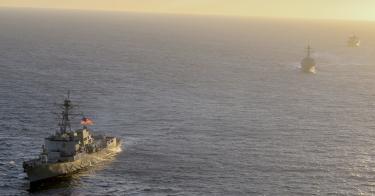Much of the transatlantic community’s attention is now focused on the war against Ukraine. That’s understandable. Strategic vision, however, ought to address opportunities, not just challenges. And no space offers as much potential return on investment as the Mediterranean and the surrounding regions of North, East, and West Africa.
To be successful, however, Western outreach must be coordinated. Disparate efforts deliver less than their sum. The effectiveness of Western aid programs has been hit and miss. PEPFAR, for instance, helped stem the global HIV/AIDS epidemic. Food production, on the other hand, isn’t keeping pace with Africa’s growing needs. Mere assistance won’t close that gap. Nor are they a match for China’s insidious Belt-and-Road incursions, which have made heavy inroads in Africa, undermining governance, fueling corruption, insecurity, and inequality, and leaving many nations effectively in thrall to Beijing.
In some cases, competing Western policies are making things worse. Green transition initiatives are impoverishing people already starved for abundant, reliable, and affordable electricity. Attempts to export woke cultural imperialism have proved upsetting and counterproductive. What is required are both better initiatives and taking advantage of the scale that a cooperative effort of the transatlantic community and like-minded partners in the Middle East and the Indo-Pacific (such as India, Japan, South Korea, and Taiwan) can bring to bear, overmatching the malicious influence of Beijing and Moscow.
The Italian government drew attention this necessity during the last NATO Summit, pressing the need for Europe to play a leading role in Africa and the Mediterranean. In the days that followed, the European Union (again, at the instigation of Italy) signed a Memorandum with Tunisia.
This Memorandum can serve as a forerunner for the stabilization of Tunis, making it less likely to fall into the clutches of China, whose ambitions are nothing less than overlording the West, and Africa. But the deal, designed primarily to stabilize Tunisia’s economy, should address even more on bringing real progress on trade and investment or the economic reforms needed to combat the underlying causes of the country’s economic distress. To be successful, the transatlantic community must follow up this deal with real engagement on the tough issues.
Tunisia ought to be a test case. Getting agreements right there ought to lead to agreements with Libya, Egypt, Niger (a key hub for migratory flows) and with other Sahel countries, with a view to establishing solid, mutually beneficial relations with African countries.
Targeted investments that harness the power of Western capital (rather than aid) and strengthen commercial interconnectivity between North Africa and Europe are also key to countering Russian and Chinese efforts to profit from destabilizing African nations and making them client states.
Rome, with its geographical position and cultural depth in the area, offers a base of operations for a dual role. Its defense and intelligence assets can help guard vital submarine communications (gas pipelines, internet cables, electricity grids) while also guaranteeing free trade in the Mare Nostrum. And it can become a European energy hub, helping the continent to break its dependency on Russian gas and, so, strengthen Europe’s energy security as well as Euro-Atlantic relations.
Italy’s recent proposal for a “Mattei Plan” could serve as blueprint for further cooperative engagement. The anticipated plan envisions an international cooperative effort aimed at, in the words of one Italian Member of Parliament, “giving back to Africa its dignity,” through the development of its energy and other resources. The goal is to establish a mutually beneficial partnership for development—the opposite of what China and Russia are doing. Italy solemnly pledges that this “won’t be predatory.” But Italy cannot act alone.
The entire West must understand the importance of the Southern flank for its own security and prosperity. This is where America’s role is crucial. Washington could be a galvanizing force to bring disparate partners to the table to hammer out an agenda that benefits all of us.
Italy will hold the G7 presidency in 2024. There is not a better time to put cooperation in the Med at the top of the agenda. Italy should set the tone by withdrawing from China’s Belt and Road, making clear there is no place for Beijing’s destabilizing influence in the region. The U.S. and Italy should promote a G7 plus on this agenda, so that the next G7 summit would include countries such as India, South Korea, and Australia. Italy and the U.S. should also jointly promote the Three Seas Initiative connecting Northern and Southern Europe.
Italy and the U.S. have a unique opportunity to lead on this matter within NATO and the EU. Establishing partnerships with nations on the other side of the Mediterranean—partnerships that really work—would greatly benefit those nations as well as both the alliance and the union.
This piece originally appeared in Real Clear Defense




